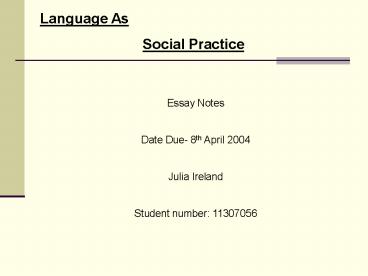Language As - PowerPoint PPT Presentation
1 / 12
Title:
Language As
Description:
Upper level- where the child could be with guidance. Julia Ireland ... A teacher helps a child with a certain aspect of a subject and as the student ... – PowerPoint PPT presentation
Number of Views:18
Avg rating:3.0/5.0
Title: Language As
1
Language As Social Practice
Essay Notes Date Due- 8th April 2004 Julia
Ireland Student number 11307056
2
Major Themes
- Discourse Communities
- Socio-cultural approaches to language and
learning - Context of Schooling
Julia Ireland
3
Introduction
- We learn to do literacy as we learn how to
behave and belong in our families and
communities (Breen et. al. 1994). This is a key
concept in the study of literacy both in the
classroom and in the home environment. - Literacy- not only the ability to read but also
the ability to comprehend what is being read as
well as being able to write in the same manner.
Julia Ireland
4
Major Theme One Discourse Communities
- A Discourse Community can be described as A
group of people who share the same beliefs and
values which are reflected, to a certain extent,
in their various meaning-making systems. - (Love et. al., 2002)
- In any type of Discourse a person can be
considered an insider or an outsider- a member or
a non-member. - Insider- familiar with the subject and language
used by other members of that community. - Outsider- unfamiliar with the subject matter and
language used by the members of the discourse
community.
Julia Ireland
5
Major Theme One Discourse Communities (cont.)
- James Gee (1991) defines a Discourse as
- A socially accepted association among ways of
using language, - of thinking and of acting that can be used to
identify oneself as a - member of a socially meaningful group of social
network - These Discourses can be classified into two
certain types of discourses - Primary Discourse- Home Environment (language
spoken, social values and Cultural Values.) - Secondary Discourse- Other groups in which you
join later in life. (Sporting Teams, School
Environment and Charity Organisations.)
Julia Ireland
6
Major Theme One- Discourse Communities (cont.)
- Acquisition
- The process of acquiring something
subconsciously - by exposure to models and a process of trial and
error, - without a process of formal teaching. This is
how most - people control their first language. (James Gee,
1991) - In the primary discourse of family, acquisition
is used to manage your first language and also to
obtain knowledge about culture and beliefs.
Julia Ireland
7
Major Theme One- Discourse Communities (Cont.)
- Contrasting to Acquisition is Learning. James
Gee (1991) defines learning as - A Process that involves conscious knowledge
gained - through teaching, thought not necessarily from
someone - officially designated a teacher. This teaching
involves - explanation and analysis, that is, breaking down
the thing - to be learned into analytic parts.
- The concept of learning is mainly present in the
secondary discourse group. - Some Cultures value learning while others value
acquisition for example, Australian Culture vs.
Tradition Aboriginal Culture.
Julia Ireland
8
Major Theme Two - Socio-cultural approaches to
language and learning
- The way we learn language in our primary
discourse communities affects the way we act,
behave and talk in our secondary discourse
communities. - Zone of Proximal Development (ZPD) developed by
Lev Vygotsky. It consists of a range of tasks
too difficult for children to master alone but
which can be learned with the guidance and
assistance of adults or more-skilled children
(Santrock, 2004, pg.230) - ZPD consists of two levels.
- Lower level- where the child is at with no
guidance - Upper level- where the child could be with
guidance.
Julia Ireland
9
Major Theme Two - Socio-cultural approaches to
language and learning
- Concept of Scaffolding, also developed by
Vygotsky. A teacher helps a child with a certain
aspect of a subject and as the student competency
increases the teacher gives less guidance and
lets the student apply their own knowledge of the
new concept they have learnt.
Julia Ireland
10
Major Theme Three Context Of Schooling
- Teaching/Learning Cycle- Set of five key stages
considered necessary to develop learning (Love
et. al., 2002). These five stages are
Engagement, Building Knowledge, Transformation,
Presentation, and Reflection. - Concept of Scaffolding introduced again. There
are three strategies that support this in
classroom context, they are Diagnosis, Planning,
and Withdrawal. - These concepts are important due to different
discourses in the school (in Australian society).
- Literacy is important in the concept of
schooling as children arent only going to learn
it with a teacher directly talking to them but
also through social interaction. It needs to be
embedded into their everyday activities, for
example having desks in blocks instead of rows
helps them to develop social skills.
Julia Ireland
11
Conclusion
- Our first exposure to literacy is through the
primary discourse communities. This gives us
basic knowledge of how to do literacy. - Throughout our lifespan we come into contact
with different discourse communities. These build
on our primary discourse.
Julia Ireland
12
References
Gee, JP 1991, What is Literacy, in Reuniting
Literacy, Mitchell, C Weller, K (eds.), Beigin
and Ganey, New York. Love, K, Pigdon, K, Baker,
G, Hamston, J 2002, Built Building
Understandings in Literacy and Teaching, 2nd
Edition, CD-ROM, The University of Melbourne,
Melbourne. Santrock, JW 2004, Child Development,
10th Edition, McGraw Hill Companies Inc., New
York.
Julia Ireland































